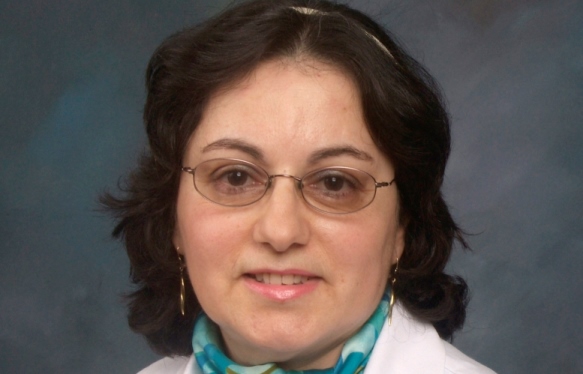
Complete regressions of cancerous tumors were observed in a mouse model when both radiation and immuno-based therapies were administered together, reported a Wayne State University School of Medicine cancer researcher.
"Radiation and cancer vaccine synergized to induce a robust immune response against the tumor, which was mediated by immune T cells capable to recognize and destroy subsequent injections of the same tumor cells," said study principal investigator Gilda Gali Hillman, Ph.D., professor of Oncology. The phenomenon is defined as specific anti-tumor immunity and demonstrates a systemic immune response, essential for the treatment of metastatic sites of cancer, she said.
The novel treatment strategy is detailed in the research article, "Radiotherapy and MVA-MUC1-IL-2 vaccine act synergistically for inducing specific immunity to MUC-1 tumor antigen," published earlier this year in the Journal for ImmunoTherapy of Cancer, a publication of the Society for ImmunoTherapy of Cancer.
The work also was highlighted by the journal's editor.
"Radiation kills cancer cells and consequently causes inflammatory responses at the site of the tumor, which can be exploited by addition of an immunotherapy approach to trigger a strong immune response against the cancer," Dr. Hillman said. "In this study, the immunotherapy approach consisted of a cancer vaccine --
MVA-MUC1-IL-2 -- built from a safe strain of vaccinia virus, a cancer antigen MUC1 and an immune stimulatory factor interleukin 2 (IL-2) to cause an immune response against mouse cancer cells."
The study results could guide clinicians in translation of radiotherapy and cancer vaccines by proving a high dose of radiation administered to the tumor is needed to cause immune events in the tumor that can be enhanced by the cancer vaccine therapy. In addition, the injection of the cancer vaccine at the site of the irradiated tumor is required to generate synergy between both modalities, and the sequence and schedule of radiation and cancer vaccine are important to optimize the efficacy of the combined strategy.
Dr. Hillman joined the School of Medicine in 1990 as director of the Department of Urology's Tumor Immunology Laboratory, where she worked to develop the field of tumor irradiation combined with immunotherapy using multiple tumor models she developed in mice. She published 24 research articles and eight review articles on radiation and immunotherapy approaches during that period.
"There was renewed interest in that strategy during the last 10 years, and multiple studies investigated the mechanisms by which tumor irradiation improves the efficacy of immunotherapy, confirming our initial studies. This is now considered a hot topic, and several clinical trials are ongoing combining radiotherapy and multiple approaches of immunotherapy," she said.
The study is applicable for the treatment of cancer with conventional radiotherapy and the MVA-MUC1-IL-2 cancer vaccine. France-based vaccine producer Transgene SA has proven its safety in several clinical trials for cancer patients, Dr. Hillman said.
"I would like to thank my collaborator of 17 years, Dr. Philippe Slos from Transgene, and my fantastic students, Shoshana Rothstein, Lyndsey Reich, Lisa Abernathy, Matthew Fountain and Kali Hankerd, who were committed to help with every aspect of the work," she said.
She also is grateful to lab assistant Christopher Yunker for his work with the mice models, and physicist Dr. Joseph Rakowski for his assistance with radiation equipment.
The work was supported by Transgene SA.
Pending funding, Dr. Hillman is looking into designing projects to combine the strategy with approaches to inhibit immunosuppression and augment the frequency of complete responders.